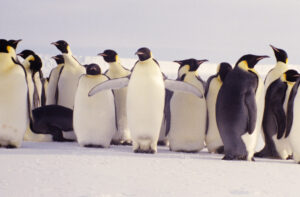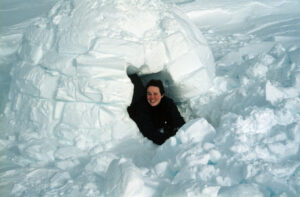When you live in Antarctica, the unrelenting cold isn’t the issue.
“Everyone always asks me about the cold. But, actually, the cold wasn’t the big problem,” Alex Gaffikin told Life and Faith.
“It was the dark that was the problem. Where we were, the sun would set at the end of May and not come back until mid-August. So you’d have a couple of months without seeing the sun and that just sent us all bananas.”
At just 22 years old Alex travelled nine weeks by sea to the Halley Research Station, on the Brunt Ice Shelf in Antarctica. She lived there for two years, working as a meteorologist.

In summer, each day featured almost twenty-four hours of daylight. But in winter the sun disappeared.
“The thing I found hardest to cope with is that you get this extra sense of being remote, away from family, away from normality,” she said.
“You get up, it’s dark. You go to work, it’s dark. You have lunch, it’s dark. You go out for an afternoon stroll, it’s dark. You come home in the evening, it’s dark.”
“It’s a very strange experience.”
The unrelenting darkness made everyone less rested, more worried, and more deflated. But even more challenging was the profound sense of isolation – enhanced by a terrain that was “flat white ice as far as the eye can see”.
“It’s hard to get a sense of distance. It’s like being at sea, but this is just ice everywhere.”

Social interaction mostly occurred within the group of sixteen winterers. A few emails went in and out each day and post arrived by ship once or twice a year. The well-organised team took turns with duties and with no shops around, “guys and girls would spend hours, days, weeks” on craft, carpentry and knitting.
They had each other for company, along with a nearby emperor penguin colony. Hanging out with the penguins helped Alex feel, if only briefly, like she was back in a crowd.
In her second winter, Alex struggled with the darkness and isolation, but also with a sense of being spiritually lost. A lifelong Christian, the nearest church (in the Falklands Islands) was about 3,000 kms away.
“I had really started to doubt everything,” she recalls. “I was actually questioning and challenging for the first time in my life, and I remember thinking, ‘What if there’s no God?’ One night I remember crying out. And I remember thinking to myself, ‘Okay, Alex. You’ve pulled the carpet from underneath you. What do you actually believe?’”
She thought of the way Jesus called on people to love their neighbours.
Alex’s doubt was alleviated not by clever ideas, but by seeing the power of enacting these words. “The funny thing is, because there were only 16 of us…I could see that you make a difference if you forgive, try to love, try to help people,” Alex said. She could clearly see the effects this had on her fellow winterers.
For her positive impact on the atmosphere of the base, Alex received a medal for meteorology and morale. She reflected, “I like to think that morale in fact is the secular word for trying to build unity and trying to love one’s neighbours. Putting myself to one side, emptying myself and really just thinking of the other – I found that worked in Antarctica.”
“I saw that through love, a mutual love, God is there. God is present. And that really when you live mutual love, you can create heaven – a little bit of heaven – on earth.”
The experience, she said, has “stuck with me for the rest of my life.”
This article was sourced from interviews with Alex Gaffikin on CPX’s podcast, Life & Faith.


